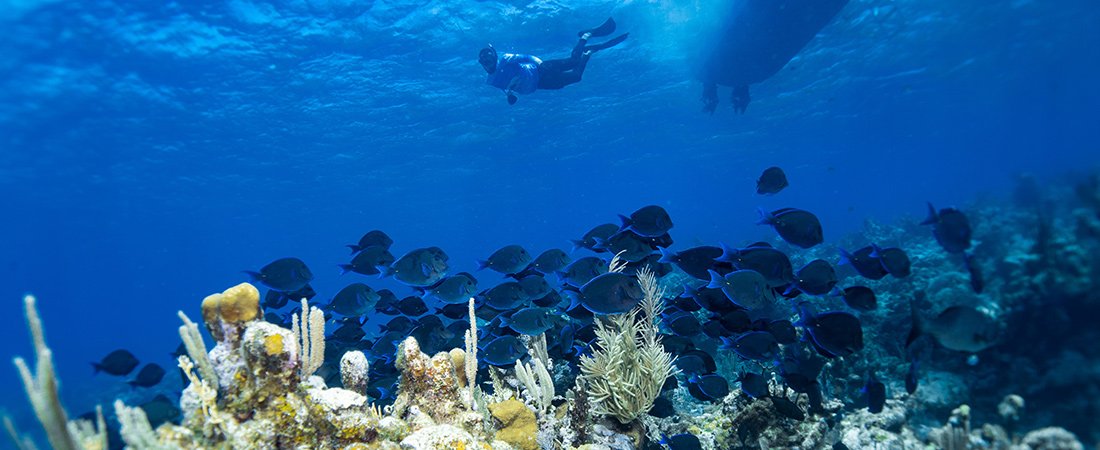Press Release: Virtual Regional Workshop for the Exchange of Experiences in Post-Storm Response Capacity to Mitigate the Impact of Hurricanes on Coral Reefs

Reef responder descends as part of the practical brigade training session. Photo: Martin Leglize
On Thursday, November 16th, MAR Fund, through the Reef Rescue Initiative (RRI) held the Virtual Regional Workshop for the Exchange of Experiences in Post-Storm Response Capacity to Mitigate the Impact of Hurricanes on Coral Reefs. The main objective was for participants to share experiences and lessons in immediate response actions to mitigate the impact of hurricanes on coral reefs. Challenges, opportunities, and strategies were identified to strengthen their efforts and consolidate regional coordination and strategic alliances in favor of the resilience and protection of the Mesoamerican Reef (MAR).
During the Virtual Regional Workshop, 104 individuals participated representing Mexico (42%), Honduras (30%), Guatemala (16%), Belize (5%), and other countries (7%) such as Colombia, Germany, Spain, and England; corresponding to various sectors, including brigade members, brigade leaders, response coordinating committees of the four MAR countries, government entities, civil society organizations, researchers and scientists, and donor representatives.
In the workshop, five panelists, representatives of various entities, presented several important themes in relation to the work on response capacity in the region and by country: 1) Claudia Ruiz, Coordinator of the MAR Fund RRI, explained the context of the project and provided a summary of how MAR Fund, its partners and donors, have strengthened local capacity to attend to the post-storm response for reefs in the four MAR countries; 2) Calina Zepeda from The Nature Conservancy shared the experience of the early warning protocol, its application in Quintana Roo, and a brief overview of its replication in Hawaii and Guam, 3) María del Carmen García from the National Commission of Natural Protected Areas (CONANP) and Jacob Rubio, a trainer and brigade member, emphasized the importance of governance and post-storm response brigades for coral reefs, specifically for Puerto Morelos in 2020, 4) Juan Carlos Huitrón, a brigade trainer, discussed the experiences and lessons from regional training to build response capacity in the region, and 5) Jacqueline Wharton, specialist in coastal resilience, shared the model for estimating the costs of post-storm response and its relevance in the application of financial mechanisms, such as parametric insurance for reefs.

Reef responders practicing the coral restoration techniques during the last brigade training in Roatán, Honduras. Photo: Martin Leglize
Regarding national experiences, the representatives of the Response Coordinating Committees in each MAR country presented their progress, achievements and challenges in the development and application of the capacity. 1) Valdemar Andrade, Executive Director of the Turneffe Atoll Sustainability Association (TASA) and representative of the Sub Coordination of the Response Committee for Reefs in Belize, shared the results and learnings of the mobilization of the brigades and the immediate attention carried out at Turneffe Atoll, in response to the impacts of Hurricane Lisa, which affected the site in November 2022, 2) Denisse Ángeles Solis, Director of the Banco Chinchorro Biosphere Reserve and Xcalak National Reef Park of CONANP, and Irving Chávez, representative of CONANP, and brigade leader for Banco Chinchorro and Xcalak, Quintana Roo, presented the project for rescuing the coral colonies affected by the stony coral tissue loss disease in Banco Chinchorro, as well as the involvement of the response brigades in this emergency, 3) Martha Medrano, of the Forestry Conservation Institute (ICF) in the Bay Islands Honduras, and Coordinator of the Response Committee for reefs in that Protected Area, told about the success in national coordination and strengthening of post-storm response governance for coral reefs in Honduras, finally, 4) Otto Palencia, of the Foundation for Ecodevelopment and Conservation (FUNDAECO), and Secretary of the Response Committee for Reefs in the Caribbean of Guatemala, spoke about the experiences and learnings in the formation of the post-storm response capacity and its network of allies in the Caribbean of Guatemala.

Reef responders learn about coral restoration techniques during the brigade training. Photo: Juan Carlos Huitron-Baca
Additionally, through various workgroups, participants identified important challenges, opportunities and strategies to continue strengthening their work in the MAR and in their sites of action. Some of the points of agreement were: identify more sources of financing to continue strengthening capacity in the region, train more reef responders and trainers, formalize the work of the brigades through a certification program, update the early warning protocol, review and update the post-storm response plans annually for the sites, improve communication between the brigade members’ committees, their safety in complex underwater conditions, and seek financial mechanisms to have an economic incentive that ensures the permanence and active participation of the brigade members.
Likewise, it seeks to strengthen strategic alliances with other groups such as the navy, fishermen and other members of the private sector such as hotels and diving operators. It is also intended to make visible to all members and the general public the importance of reefs due to the ecosystem services they provide and the social, health, and economic benefits they bring to the coastal communities of the MAR.
The ultimate goal of this work of early response to post storm events is to have effective coral restoration to preserve and restore these ecosystems, and at the same time guarantee the safety of the brigade members and other members who work in coordination, to ensure that the MAR continues to be a vibrant and biodiverse ecosystem.
CONTACT INFORMATION
Claudia Ruiz
Coordinator
MAR Fund Reef Rescue Initiative
cruiz@marfund.org
Zara Guifarro
Technical Assistant
MAR Fund Reef Rescue Initiative
zguifarro@marfund.org





